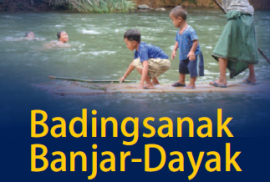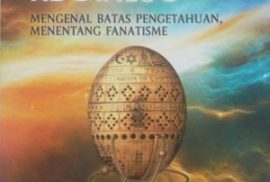Indigenous Affirmation of Harmony among Dayak and Banjar
 Paperback: 96 pages
Paperback: 96 pages
Language: Indonesia
ISBN: 978-602-96257-4-5
Publisher: CRCS
In the era of political freedom following the end of Soeharto regime, identity politics goes strong in Indonesia. Ethnicity and religion often intertwines by which identity negotiation and accommodation sometimes ended in displease. This resulted in the outbreaks of communal violence in the recent years that demonstrated the prominent roles of religious and ethnic identities. This poses a question about the affectivity of diversity management in Indonesia.



 Dalam perjalanan eksistensialnya, manusia berusaha menguak berbagai misteri jagad raya hingga mempertanyakan “Realitas”. Termasuk di dalamnya usaha keras seorang Albert Einstein yang terobsesi merumuskan teori relativitas untuk menyingkap kehendak Tuhan atas penciptaan. Namun, kecanggihan indera dan rasio manusia memiliki batas-batas tertentu. Realitas tidak pernah terengkuh secara mutlak, apalagi Tuhan.
Dalam perjalanan eksistensialnya, manusia berusaha menguak berbagai misteri jagad raya hingga mempertanyakan “Realitas”. Termasuk di dalamnya usaha keras seorang Albert Einstein yang terobsesi merumuskan teori relativitas untuk menyingkap kehendak Tuhan atas penciptaan. Namun, kecanggihan indera dan rasio manusia memiliki batas-batas tertentu. Realitas tidak pernah terengkuh secara mutlak, apalagi Tuhan. In this paper I explore the effects of locality versus globalization in the process of ethno-religious identity construction of an indigenous community or ethnic subgroup known as the Katab Kebahan Dayak. That this community is located far in the interior of the large province of West Kalimantan, Indonesia, does not preclude it from experiencing exogenous shocks and challenges to its way of life. In preparing this study I have followed the ethnographic and anthropological approaches that have been particularly influential on research in this region.2 Globalization has provoked the awakening of the silent voice of local traditions, especially those of indigenous communities. According to Irwan Abdullah and George Junus Aditjondro, the theme of locality has recently shifted from an out-of-the-way discussion to a mainstream scholarly concern under the rubric of ‘kebangkitan lokalitas dalam dunia global’ (the awakening of locality in the global era).3 There are several reasons why the phenomenon of Dayak Katab Kebahan into a global academic discussion. Recent ethnographic research has prompted closer attention to social and cultural phenomena associated with religion and religious practices, and made local traditions a more attractive, even ‘exciting’, topic across many disciplines. For many years before this, local cultures and traditions had been considered primitive and irrational, and classified as uncivilized to the degree of their remoteness from modernization. The self-proclaimed universality and rationality of modernity were once thought capable of (eventually) remedying the problems that have arisen in the wake of modernizing development. That is a view no longer held with much confidence. It has become increasingly obvious that development has brought some peoples to the very edge of destruction and led to imbalances in society and the natural world, and even to human rights violations. The environmental crisis emerging as a result of the illegal logging and gold mining integral to modern capitalist development in West Kalimantan is but one example.5
In this paper I explore the effects of locality versus globalization in the process of ethno-religious identity construction of an indigenous community or ethnic subgroup known as the Katab Kebahan Dayak. That this community is located far in the interior of the large province of West Kalimantan, Indonesia, does not preclude it from experiencing exogenous shocks and challenges to its way of life. In preparing this study I have followed the ethnographic and anthropological approaches that have been particularly influential on research in this region.2 Globalization has provoked the awakening of the silent voice of local traditions, especially those of indigenous communities. According to Irwan Abdullah and George Junus Aditjondro, the theme of locality has recently shifted from an out-of-the-way discussion to a mainstream scholarly concern under the rubric of ‘kebangkitan lokalitas dalam dunia global’ (the awakening of locality in the global era).3 There are several reasons why the phenomenon of Dayak Katab Kebahan into a global academic discussion. Recent ethnographic research has prompted closer attention to social and cultural phenomena associated with religion and religious practices, and made local traditions a more attractive, even ‘exciting’, topic across many disciplines. For many years before this, local cultures and traditions had been considered primitive and irrational, and classified as uncivilized to the degree of their remoteness from modernization. The self-proclaimed universality and rationality of modernity were once thought capable of (eventually) remedying the problems that have arisen in the wake of modernizing development. That is a view no longer held with much confidence. It has become increasingly obvious that development has brought some peoples to the very edge of destruction and led to imbalances in society and the natural world, and even to human rights violations. The environmental crisis emerging as a result of the illegal logging and gold mining integral to modern capitalist development in West Kalimantan is but one example.5 CRCS-ICRS Wednesday Forum on 15 December 2010 was a homecoming story of Mark Woodward, one of the lecturers of CRCS UGM from the United States. Woodward, a professor of Arizona State University, during his return, was observing the development of political issues in his country. He found polemics related with constructing plan of an Islamic cultural center in New York named Park51 or Cordoba House that is likely known as Ground Zero Mosque, a title given due to effects of political sentiment.
CRCS-ICRS Wednesday Forum on 15 December 2010 was a homecoming story of Mark Woodward, one of the lecturers of CRCS UGM from the United States. Woodward, a professor of Arizona State University, during his return, was observing the development of political issues in his country. He found polemics related with constructing plan of an Islamic cultural center in New York named Park51 or Cordoba House that is likely known as Ground Zero Mosque, a title given due to effects of political sentiment.